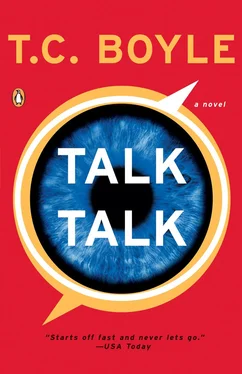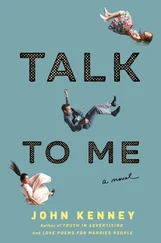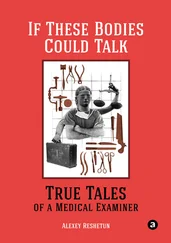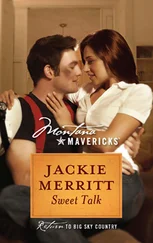She felt the door open behind her, her old trick, and turned to see her mother and Bridger standing there in the doorway, looking apologetic. “Can we come in?” her mother signed clumsily.
“Yeah, sure,” she said, grandly waving them in. She felt a quick sharp stab of embarrassment. Had they stood there listening? Had they knocked? Had they heard her rehearsing the name of her book? And her own name? Had she said “Peck Wilson” aloud?
“Almost done?” Bridger signed. His face was soft, open, and she could have read his expression as loving and supportive, but he wasn't fooling her. This was a guilty look, edged with alarm, a look complicit with her mother's-they “had” heard. An irrational anger started up in her: her own lover, her own mother.
“Yes,” she said. “Or no, not really. I'm just getting nowhere, that's all. Spinning my wheels, right?” And what was that, a racing term? Or was it when you were stuck in the snow or the mud? “Why, what's the plan?”
Her mother had taken to Bridger in a way Dana would have found gratifying under other circumstances, making it her sworn duty to show him every tourist site in the city, from the Statue of Liberty to MoMA to the American Indian Museum, Ground Zero and Grant's Tomb. She'd even taken him on the Circle Line tour around the Battery and up the East River, through the lively corrugations of Spuyten Duyvil and back down the Hudson on the West Side while Dana was-ostensibly-working. Her mother's smile strained till it blew up in her face. “I don't know,” she said, “we were just thinking we might go to a matinee, something light-a musical, maybe. Bridger's never been to a show and it would be a shame if he-”
“We don't have to go,” he said, slumping his shoulders and fixing his smile, and of course what he meant was that they did have to go or he would never get over it. “Can you handle it?”
“What do you mean 'can I handle it'? It's not a revival of “Children of a Lesser God,” is it?”
They both laughed. But these were strained laughs-she could tell by the way their eyes flashed at each other like those kissing fish in an aquarium. “We were thinking maybe “The Lion King,”” he said. “Or “Rent,” if we can get into it.”
““Equus,”” she said. “What about “Equus?”” She was being cruel, but she couldn't help herself. She was remembering the first time she'd ever seen the National Theater of the Deaf, when she was a freshman at Gallaudet, the year Deaf Power came into its own and swept the university. For the first time in Gallaudet's history, all the way back to its founding in 1864, a deaf president was installed after the entire student body took to the streets to protest the naming of yet another hearing chief executive. They marched in the streets for a week, chanting “Down with Paternalism!” and “We Are Not Children!”
“No More Daddies,” they shouted, “No More Mommies!” The wind stung her eyes. The cops came on their silent shuddering horses. She'd never felt more caught up and passionate in her life. And when the curtain opened on the play on that final night, the night of their triumph, the house was full to the rafters and she had to find a seat on the floor, everyone holding their breath in anticipation. It took her a moment to understand: this was no parade of mimes, no revival of “Death of a Salesman” or “The Glass Menagerie” in dumb show, but a new play, commissioned and written in their own language, the language of their new president. She exchanged a look with the girl sitting next to her, her roommate, Sarah, whose eyes flew back to the stage while her hands lay motionless in her lap, and she began to breathe again.
And now they wanted her to sit through “The Lion King?”
“No,” she said, “I think I'll just stay here and kill myself instead.”
“Come on,” Bridger said, and when he put a hand on her shoulder and ran it up the back of her neck, she pulled away from him. “It'll be fun.”
“You go,” she said.
Her mother's face hovered over her. “Lunch?” she offered. “Why don't we all just go to lunch then? What do you say?”
“No, really,” she said. “You go.”
On the day they picked up the car, the day she planned to sign over the insurance check to the man in the garage, retrieve her keys and then, no matter what Bridger or her mother or anyone else might have to say about it, go directly to Peck Wilson's house in the hope of spotting the Mercedes there in the driveway, the sun seemed to rise right up out of the front room of her mother's apartment, already riding high and scorching the earth by the time she and Bridger arrived, on foot and sweating, at Grand Central. Bridger had talked her into walking-for the exercise, of course, but there was no reason to be wasting money on cab fare when neither of them had a job and their credit was mutually shot. She bought three plastic bottles of water in the one-liter size while Bridger saw to the bagels in the brown paper bag and picked up the “Times” and the “Daily News” and then they settled into the Metro North car like reverse commuters. The other passengers looked bored and enervated, nobody talking, and that pleased her in an odd way, their silence layered over hers. She was imagining the other sounds-the rattling of the undercarriage, the hiss of the automatic doors-when Bridger tapped her on the arm and asked for one of the bottles of water.
She watched him unscrew the plastic cap and hold the bottle to his lips until he had to come up for air. The sweat stood out on his upper lip and his hair had thickened with it. “It's hot,” he mouthed. “Wow, it's hot.” He handed her half a bagel, neatly sliced in two. Outside, beyond the moving windows, the river looked as if it had just been refilled with pure clean tap water instead of the usual gray-green bilge. “You know those pictures of-?” he said, but she didn't catch the end of it. A place name, long word.
“What?”
“Afghanistan,” he said, spelling it out. “From the war, like, when was it-couple of years ago? Did you notice that every mujahedin carried three things into battle with him-a Kalashnikov rifle, a rocket launcher and a liter bottle of Evian, just like this?”
“Yeah,” she said, “yeah, it was funny. Just goes to show you what you value when you have nothing.”
“Right, you have nothing, no water, no trees, nothing but rocks. That's why you bomb the World Trade Center. That's why you carry weapons-so you can take what you want.”
“Like Peck Wilson.”
He gave her a look. The train lurched over a bad section of track, jolting the bagel he'd been gesturing with. She watched it float up against the backdrop of the Hudson, tightly clamped in the grip of his floating fingers. “I guess,” he said. “Yeah.”
“Do you think he has a gun?”
He shrugged. “He's an ex-con, isn't that what Frank Calabrese said?”
“So yes?”
“Which is all the more reason to stay away from him. I mean, look what it's got you, what it's got us-ruined credit, running all over the country, no money, no job, and now your car.”
“But we are going to drive by, right? Or maybe park around the block and just walk by in case he recognizes my car”-he was saying something but she wasn't watching-“just walk, that's all. And if we see him, or the car-the car would be the key-we call the police.”
“Oh, yeah,” he said, “yeah. They've been real friendly and understanding, haven't they?”
She felt that burr of irritation again, couldn't help herself. She made an effort to control her voice, breathe in, breathe out. “I'm not giving up,” she said, and she had no idea what she sounded like. “Not now. Not when we're this close.”
It took him a minute. He turned his head to gaze out on the river and the distant fractured cliffs of the Palisades, then swung back to her, his eyes compact and hard. “That's all we're going to do,” he said. “Just walk.”
Читать дальше












